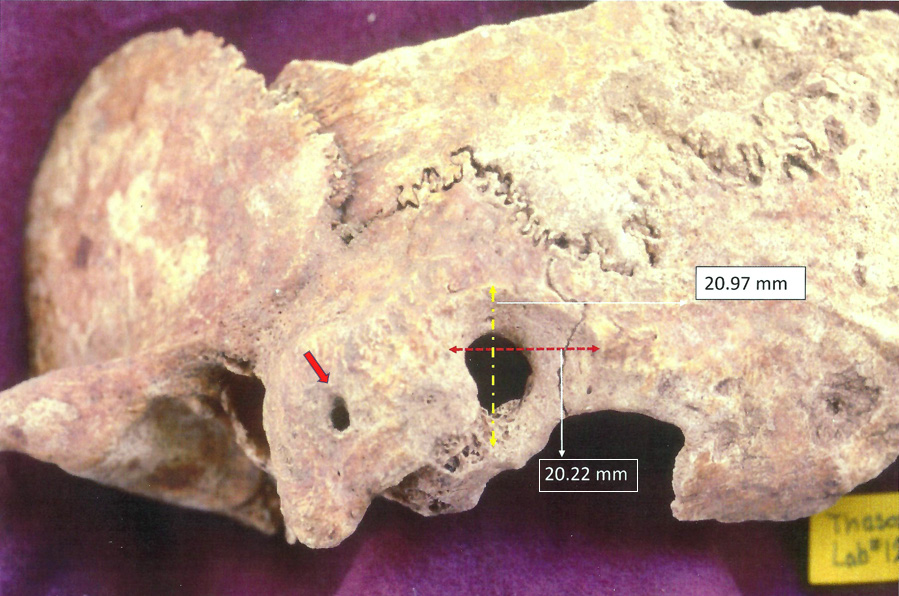Published:
Adelphi Researcher Discovers Early, Complex Brain Surgery in Ancient Greece

Ectocranial view of paleopathological specimen: a) red arrow points to orifice on the mastoid process, and b) surgical preparation dimensions peripheral to trephination
New research from Adelphi University has revealed the first forensically assessed archeological discovery of remains of a group of domineering mounted archer/lancers and their kin of the Eastern Roman Empire from the turbulent ProtoByzantine period, which spanned the fourth to seventh centuries.
Ten skeletal remains—four women and six men, likely of high social standing—were discovered in the Paliokastro site on Thasos island in Greece. Their bones illuminated their physical activities, traumas and even a complex form of brain surgery.
“The burial place and architecture of the funerary monumental church and the construction of the graves is spectacular,” said lead researcher and anthropologist Anagnostis Agelarakis, PhD, who added that it indicates the high social standing of the individuals buried there.

Archaeological Museum of Thasos; Adelphi student assistants during the skeletal analysis
The advanced preservation of their remains and the impressive location and architecture of the funerary monumental church where they were buried exhibit their high status in the region.
“According to the skeleto-anatomic features of the individuals, both men and women lived physically demanding lives,” said Dr. Agelarakis, professor of anthropology in Adelphi’s Department of History. “The very serious trauma cases sustained by both males and females had been treated surgically or orthopedically by a very experienced physician/surgeon with great training in trauma care. We believe it to have been a military physician.”
As for the brain surgery, Dr. Agelarakis suggests that “even despite a grim prognosis, an extensive effort was given to this surgery for this male. So, it’s likely that he was a very important individual to the population at Paliokastro.”
Dr. Agelarakis and his colleagues were able to derive medical and surgical data, as well as paleopathological data, on this “extraordinary head and neck surgery and the great efforts of the surgeon.” It was determined that the likely cause for the surgical intervention was infection and that the archer died shortly after or during surgery.
“The surgical operation is the most complex I have ever seen in my 40 years of working with anthropological materials,” Dr. Agelarakis said. “It is unbelievable that it was carried out, with most complicated preparations for the intervention, and then the surgical operation itself which took place, of course, in a pre-antibiotic era.”
The results are described in a new book, Eastern Roman Mounted Archers and Extraordinary Medico-Surgical Interventions at Paliokastro in Thasos Island during the ProtoByzantine Period: The Historical and Medical History Records and the Archaeo-Anthropological Evidence, by Archaeopress, Access Archaeology.
About Adelphi: A modern metropolitan university with a personalized approach to higher learning
Adelphi University, New York, is a highly awarded, nationally ranked, powerfully connected doctoral research university dedicated to transforming students’ lives through small classes with world-class faculty, hands-on learning and innovative ways to support academic and career success. Adelphi is one of just four companies and the only university on Long Island to be named among America’s Best Employers by State for 2023 by Forbes.
A surge in 2024 rankings by U.S. News & World Report—up 19 spots as a Best College, up 85 spots for Social Mobility and up 35 spots as a Best Value College—supports Adelphi’s rising reputation. Adelphi serves more than 7,400 students at its beautiful main campus in Garden City, New York—just 23 miles from New York City’s cultural and internship opportunities—and at dynamic learning hubs in Brooklyn, the Hudson Valley and Suffolk County, as well as online.
More than 119,000 Adelphi graduates have gained the skills to thrive professionally as active, engaged citizens, making their mark on the University, their communities and the world.
For further information, please contact:
Todd Wilson
Strategic Communications Director
p – 516.237.8634
e – twilson@adelphi.edu
